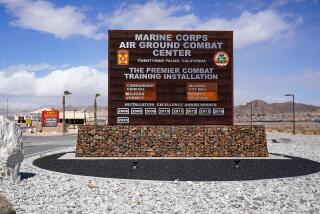Be ready for Iraq shift, military told
- Share via
WASHINGTON — Taking note of the debate over the Iraq war in the presidential race, the chairman of the Joint Chiefs of Staff told Pentagon officials in a town hall meeting Thursday that the military must be prepared to change policy and carry out the wishes of the next president.
But at a news conference afterward, Navy Adm. Michael G. Mullen cautioned against policies that include a rapid withdrawal from Iraq, saying leaving too quickly would undermine recent security gains.
“I do worry about a rapid withdrawal,” said Mullen, who serves as the top military advisor to the president.
Mullen would not specify what he considered too fast. “I am talking about a withdrawal that would be so fast that it would leave us in a chaotic situation, that the gains we have made would be lost,” he said.
In the session with members of the Joint Staff, the primary planning organization in the Pentagon, Mullen said it was crucial for the military to remain apolitical. The uniformed military and the Joint Staff must be a “solid foundation” in the transition between the Bush administration and its successor, Mullen told them.
Both of the Democratic presidential candidates back accelerated troop withdrawals. Sen. Hillary Rodham Clinton has said she would pull out up to two brigades a month. Sen. Barack Obama has supported a similar pace of reductions.
Military leaders have been more cautious. Mullen’s predecessor, Marine Gen. Peter Pace, said the military could safely withdraw one brigade a month. Army Gen. David H. Petraeus, the top U.S. military commander in Iraq, is more cautious still.
Petraeus has been withdrawing brigades sent last year as part of the U.S. troop buildup, but the reductions have come slowly and he has proposed a pause in further withdrawals in July, when the troops sent as part of the buildup are gone. He will make formal recommendations on troop levels in April.
The leading Republican candidate, Sen. John McCain, opposes troop reductions unless requested by commanders.
Mullen said navigating the change in presidential administrations will be a significant challenge and said the Pentagon must be prepared for potential changes in strategy and policy.
“We need to be the solid foundation, totally apolitical in our view, totally supportive of the president of the United States, no matter who he or she might be in the future,” Mullen said. “We take our orders from them and we march off.”
Mullen added that maintaining an apolitical stance was crucial to retaining the “trust and confidence” of political leaders and the public.
Military officials close to Mullen said he had focused the planning staff recently not on the next administration’s policies but on recommendations to Bush for military policy in Iraq for the second half of 2008, in the wake of the troop buildup.
Mullen said recommendations by the Joint Chiefs would encompass a broader perspective than that of Petraeus, who is responsible for looking more narrowly at Iraq.
“The Joint Chiefs are working right now on recommendations, basically putting together our best military advice on the next steps,” Mullen said. “The Joint Chiefs are looking at this from a global perspective, a strategic perspective.”
The Joint Chiefs have favored steeper troop reductions than those proposed by Petraeus. Petraeus and the chiefs avoided a sharp disagreement last year by delaying decisions about deeper post-surge cuts until this spring.
On Thursday, Mullen did not specify what his recommendation would be, but he said the military was trying to balance multiple priorities.
“It is this very delicate balance between continuing to make progress in Iraq, to resource what we need in Afghanistan and give the troops a break from a long, demanding time at war,” he said.
--
More to Read
Sign up for Essential California
The most important California stories and recommendations in your inbox every morning.
You may occasionally receive promotional content from the Los Angeles Times.













